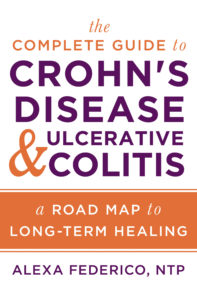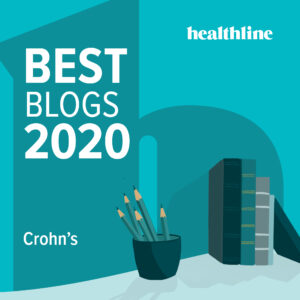I’m ecstatic to bring you this guest post from another autoimmune and real health warrior, Ali Le Vere. Ali never makes a claim without backing it up with extensive research as you will see here. See her full bio at the end of the article to see how to follow along with her, because trust me you need to!
The Epidemic of Inflammatory Bowel Disease
Crohn’s disease and ulcerative colitis are relapsing-remitting autoimmune disorders which are classified as subtypes of inflammatory bowel disease (IBD). A confluence of variables contribute to the development of IBD, including genetic proclivities, microbial dysbiosis, and environmental triggers that culminate in a dysregulated immune system. Although over two hundred single nucleotide polymorphisms, or point mutations, are implicated in the development of IBD, the skyrocketing incidence of these disorders in recent years cannot be accounted for by evolving genetic diversity, since genes change on much larger time scales (Shouval & Rufo, 2017). Immunosuppressive drugs, biologic agents, and steroid therapy are the standard of care, but there are also proven natural substances outside of the radar of conventional gastroenterologists which have studies substantiating their ability to either incite or maintain remission.
Gut Dysbiosis: A Root Cause of Inflammatory Bowel Disease
Crohn’s disease is theorized to be an inappropriate inflammatory response to intestinal microbes in a genetically susceptible host (Abraham & Cho, 2009). Alterations of the microbial ecosystem appear in Crohn’s disease, as evidenced by increased counts of Bacteroides and enterobacteria, more virulent strains of E. coli, and decreased populations of commensal bacteria such as the gut barrier reinforcing, butyrate-producing bifidobacteria and Faecalibacterium prausnitzii (Andoh et al., 2009; Favier et al., 1997; Willing et al., 2009; Baumgart et al., 2007).
Researchers articulate the central role of the microbiota in these disorders with: “The etiology of IBD is partly attributed to a deregulated immune response to gut microbiome dysbiosis” (Halfvarson et al., 2017). Similarly, Qiao and colleagues (2016) state that, “Patients with inflammatory bowel disease (IBD) exhibit impaired control of the microbiome in the gut, and ‘dysbiosis’ is commonly observed”. In fact, “Cross-sectional studies have revealed microbial signatures for different IBD subtypes, including ulcerative colitis, colonic Crohn’s disease and ileal Crohn’s disease” (Halfvarson et al., 2017). In a recent study, researchers examined how the composition of the microbiota in patients with inflammatory bowel disease underwent dramatic shifts, which correlated with symptomatology and disease progression (Halfvarson et al., 2017).
How Probiotics Improve Chronic Inflammatory Disorders
When administered in a strain-specific fashion, probiotics elicit anti-inflammatory effects in chronic diseases where oxidative stress plays an integral role, including microflora-related gastrointestinal disorders such as antibiotic-related diarrhea, infectious gastroenteritis, and IBD (Isolauri, Kirjavainen, & Salminen, 2002; O’Sullivan et al., 2005). Probiotic therapy is defined as “the feeding of (live) non-pathogenic bacteria, originally derived from the alimentary tract, for disease treatment or health promotion” (O’Sullivan et al,. 2005, p. 3). The resident microflora of the gastrointestinal tract not only protects mucosal integrity, reinforcing the gut barrier, but they also educate the immune system to prevent self-directed immune responses and metabolize toxicants and fecal residue (O’Sullivan et al., 2005).
At a mechanistic level, probiotics can competitively inhibit pathogenic or pro-inflammatory microbiota, crowding out bad bacteria by occupying attachment sites (Lorea Boroja et al., 2007). Probiotics can also decrease production of pro-inflammatory signaling molecules, or favorably modify the degradation, elimination, and presentation of antigens that incite immune responses (Lorea Boroja et al., 2007).
Probiotic administration may likewise modulate the equilibrium between the T helper 1 (Th1), Th2 and regulatory T (Treg) cell arms of the immune system, which become disrupted in autoimmune disease and can become skewed in the direction of Th1 or Th2 (Lorea Baroja et al., 2007). In addition, probiotic strains can up-regulate the production of anti-inflammatory cellular messengers called interleukin (IL)-10 and transforming growth factor-beta (TGF-β), which also have the benefit of promoting activity of regulatory T cells, which are pivotal to preventing autoimmune responses (Pessi et al., 2000; Di Caro et al., 2005).

Strain-Specific Probiotic Yogurt Mitigates Inflammation in Crohn’s and Colitis
In one study, 20 female healthy controls and 20 female subjects with IBD, 15 of whom had Crohn’s disease and five who had ulcerative colitis, were recruited to consume 125 grams (a little over half of a cup) of yogurt containing Lactobacillus rhamnosus GR-1 and Lactobacillus reuteri RC-14 strains for one month (Lorea Baroja et al., 2007). Although no subjects were using antibiotics, no attempts were made to control for ongoing medication or steroid use, and all of the IBD cohort were in active flares characterized by symptoms such as liquid stools and abdominal pain (Lorea Baroja et al., 2007).
These strains were selected for their proficiency in resolving mucosal infections, including bacterial vaginosis and urinary tract infections, and surviving transit through the gastrointestinal tract intact (Reid et al., 2001). A fermented yogurt supplemented with these same strains likewise resolved diarrhea in all subjects within two days in sub-Saharan African women with HIV/AIDS (Anukam et al., 2008). Thus, it was hypothesized that these probiotic strains could engender an anti-inflammatory immunological milieu in IBD (Lorea Baroja et al., 2007). This speculation came to fruition, as consumption of the yogurt significantly increased the proportion of regulatory T cells (Lorea Baroja et al., 2007). Regulatory T cells are analogous to the conductor of the physiological orchestra, maintaining immune balance and preventing any subtype of immune cells from becoming dominant.
Regulatory T Cells Implicated in the Pathogenesis of Crohn’s and Colitis
Because they actively suppress inappropriate immune responses, researchers refer to regulatory T cells as the “peacekeepers in the gut” (Allez & Mayer, 2004). This immune subset maintains oral tolerance, preventing inappropriate activation of immune defenses against commensal microbes and dietary antigens present in the intestinal lumen (Allez & Mayer, 2004). Not only is loss of oral tolerance fundamental to development of IBD, but “A lack of activation and/or expansion of regulatory cells could play a role in the uncontrolled inflammation seen in IBD” (Allez & Mayer, 2004, p. 666). In fact, regulatory T cells can prevent the development of a myriad of allergic and autoimmune disorders, including autoimmune gastritis, autoimmune thyroiditis, insulitis, and juvenile idiopathic arthritis (Lorea Baroja et al., 2007).
Although regulatory T cells in Crohn’s and colitis retain sufficient suppressive activity, studies have elucidated that the number of regulatory T cells in the peripheral pool is inadequate to supply enough to the inflamed mucosa during active flares of IBD (Maul et al., 2005). Thus, a compensatory expansion of the number of regulatory T cells is needed to promote and maintain remission in IBD (Maul et al., 2005). Therefore, it is impressive that the percentage of regulatory T cells before and after the yogurt treatment mirrored those previously reported to be observed in patients with active and inactive IBD, respectively (Maul et al., 2005).
Anti-Inflammatory Effects of Lactobacillus rhamnosus GR-1 and Lactobacillus reuteri RC-14
Critically, the yogurt treatment was accompanied by a significant decrease in the level of monocytes and dendritic cells that produce tumor necrosis factor-alpha (TNF-α) and interleukin(IL)-12, two pro-inflammatory cytokines, or inflammation-promoting intercellular messengers (Lorea Baroja et al., 2007). TNF-α, in particular, lies at the crux of the inflammatory cascade that perpetuates IBD, so much so that TNF-α antibody treatments including adalimumab (Humira) and Infliximab (Remicade) are used to induce remission in conventional medicine (Travassos & Cheifetz, 2005).
On the other hand, IL-12 is the cytokine that drives the pathogenesis of Crohn’s disease by directing T cells to differentiate in favor of a skewed Th1 effector cell profile, causing disharmony between the Th1, Th2, and regulatory T cell branches (Bouma & Strober, 2003). The researchers observed an indirect correlation between TNF-α and IL-12 synthesis by monocytes and dendritic cells and the numbers of regulatory T cells in IBD patients, meaning that the higher the regulatory T cell count, the lower the production of these inflammatory mediators (Lorea Baroja et al., 2007). This implies that regulatory T cells suppressed production of these pro-inflammatory mediators, and that therefore the expansion of this cell population underlies the therapeutic efficacy of these strains in IBD (Lorea Baroja et al., 2007).
Practical Applications
These same strains are available over the counter in the Femdophilus product from Jarrow Formulas as well as the Pro-Flora Women’s Probiotic from Integrative Therapeutics. Any Lactobacillus rhamnosus or Lactobacillus reuteri, which indicate the genus and species level taxonomic classifications, respectively, cannot be substituted for the GR-1 and RC-14 strains, since the principle of strain specificity dictates that different strains elicit divergent therapeutic effects. Research indicates that extrapolation of results from one strain to another, even from the same species, is impossible (Marteau, 2011).
In this study, yogurt was selected as the delivery medium as a nutritional supplement due to the loss of appetite that occurs secondary to many pharmaceutical agents prescribed in IBD. Therefore, it would be feasible to replicate this mode of administration by using the capsules as a starter and making homemade yogurt with a dairy-based or plant-based milk, as tolerated.
Using these probiotic strains in isolation, however, does not constitute a magic bullet, but rather represents an adjunctive therapy that can be used with other evidence-based natural substances and conventional interventions to induce and maintain remission. A holistic approach that incorporates an anti-inflammatory, oligoantigenic diet, restorative sleep, detoxification, hormonal balance, and mobilization of social support. To see more natural remedies for Crohn’s disease substantiated by the scientific literature, see my article “Proven Herbal Treatments for Crohn’s Disease”.
References
Abraham, C., & Cho, J. H. (2009). Inflammatory Bowel Disease. New England Journal of Medicine, 361, 2066-2078.
Allez, M., & Mayer, L. (2004). Regulatory T cells: peace keepers in the gut. Inflammatory Bowel Disease, 10(5), 666-676.
Andoh, A. et al. (2009). Faecal microbiota profile of Crohn’s disease determined by terminal restriction fragment length polymorphism analysis. Alimentary Pharmacological Therapies, 29, 75-82.
Anukam, K.C. et al. (2008). Yogurt containing probiotic Lactobacillus rhamnosus GR-1 and L. reuteri RC-14 helps resolve moderate diarrhea and increases CD4 count in HIV/AIDS patients. Journal of Clinical Gastroenterology, 42(3), 239-243. doi: 10.1097/MCG.0b013e31802c7465.
Baumgart, M. et al. (2007). Culture independent analysis of ileal mucosa reveals a selective increase in invasive Escherichia coli of novel phylogeny relative to depletion of Clostridiales in Crohn’s disease involving the ileum. International Society for Microbial Ecology Journal, 1, 403-18.
Bouma, G., & Strober, W. (2003). The immunological and genetic basis of inflammatory bowel disease. National Reviews in Immunology, 3, 521-533.
Di Caro, S. et al. (2005). Effects of Lactobacillus GG on genes expression pattern in small bowel mucosa. Digestive and Liver Disease, 37, 320-329.
Favier, C., Neut, C., Mizon, C., Cortot, A., Colombel, J. F. & Mizon, J. (1997). Fecal beta-D-galactosidase production and Bifidobacteria are decreased in Crohn’s disease. Digestive Disease Science, 42, 817-22.
Halfvarson et al. (2017). Dynamics of the human gut microbiome in inflammatory bowel disease. Nature Microbiology, 2, 17004. doi: 10.1038/nmicrobiol.2017.4.
Isolauri, E., Kirjavainen, P.V., & Salminen, S. (2002). Probiotics: a role in the treatment of intestinal infection and inflammation? Gut, 50, 54–59.
Lorea Baroja, M. et al. (2007). Anti-inflammatory effects of probiotic yogurt in inflammatory bowel disease patients. Clinical Experiments in Immunology, 149(3), 470-479.
Marteau, P. (2011). Evidence of Probiotic Strain Specificity Makes Extrapolation of Results Impossible From a Strain to Another, Even From the Same Species. Annals of Gastroenterology & Hepatology, 1-3.
Maul, J. et al. (2005). Peripheral and intestinal regulatory CD4+ CD25(high) T cells in inflammatory bowel disease. Gastroenterology, 128(7), 1868-1878.
O’Sullivan, G.C. et al. (2005). Probiotics: an emerging therapy. Current Pharmacological Design, 11, 3–10.
Pessi, T. et al. (2000). Interleukin-10 generation in atopic children following oral Lactobacillus rhamnosus GG. Clinical Experiments in Allergy, 30, 1804-1808.
Reid, G. et al. (2001). Oral probiotics can resolve urogenital infections. FEMS Immunology and Medical Microbiology, 30(1), 49-52.
Travassos, W.J., & Cheifetz, A.S. (2005). Infliximab: use inflammatory bowel disease. Current Treatments in Gastroenterology, 8, 187-196.
Willing, B., Halfvarson, J., Dicksved, J., Rosenquist, M., Jarnerot, G., Engstrand, L., Tysk, C. & Jansson, J. K. (2009). Twin studies reveal specific imbalances in the mucosa-associated microbiota of patients with ileal Crohn’s disease. Inflammatory Bowel Disease, 15, 653-60.
Qiao, Y.Q., Cai, C.W., & Ran, Z.H. (2016). Therapeutic modulation of gut microbiota in inflammatory bowel disease: More questions to be answered. Journal of Digestive Disease, 17(12), 800-810. doi: 10.1111/1751-2980.12422.
 Ali Le Vere is the Senior Researcher and Staff Writer at GreenMedInfo.com, the world’s most widely referenced, evidence-based natural medical resource. She holds dual Bachelor of Science degrees in Human Biology and Psychology, minors in Health Promotion and in Bioethics, Humanities, and Society, and is a Master of Science in Human Nutrition and Functional Medicine candidate. She has previously held research assistantships in cognitive psychology and medical anthropology under the Wenner-Gren grant, and is in the process of completing all of the advanced practice modules through the Institute for Functional Medicine. Having contended with chronic illness, her mission is to educate the public about the transformative potential of therapeutic nutrition and to disseminate information on evidence-based, empirically rooted holistic healing modalities. Subscribe to her newsletter at her website Empowered Autoimmune, connect with her on Instagram and Twitter, and join her private Facebook community which is a support group for chronic illness.
Ali Le Vere is the Senior Researcher and Staff Writer at GreenMedInfo.com, the world’s most widely referenced, evidence-based natural medical resource. She holds dual Bachelor of Science degrees in Human Biology and Psychology, minors in Health Promotion and in Bioethics, Humanities, and Society, and is a Master of Science in Human Nutrition and Functional Medicine candidate. She has previously held research assistantships in cognitive psychology and medical anthropology under the Wenner-Gren grant, and is in the process of completing all of the advanced practice modules through the Institute for Functional Medicine. Having contended with chronic illness, her mission is to educate the public about the transformative potential of therapeutic nutrition and to disseminate information on evidence-based, empirically rooted holistic healing modalities. Subscribe to her newsletter at her website Empowered Autoimmune, connect with her on Instagram and Twitter, and join her private Facebook community which is a support group for chronic illness.






